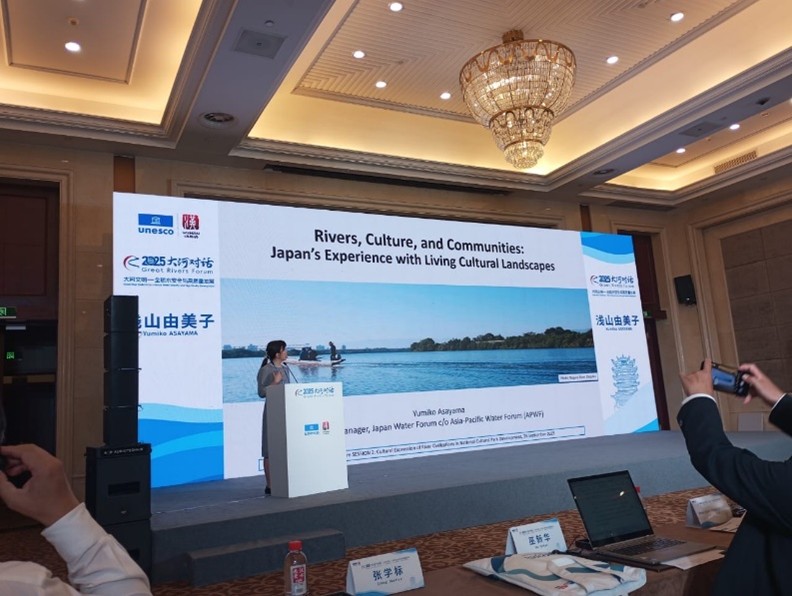Participation Report: 2025 Great Rivers Forum “Great River Civilizations – Global Water Security and High-Quality Development”
Overview
I participated in the international forum “Great River Civilizations – Global Water Security and High-Quality Development,” held in Wuhan, China, from 26 to 27 September 2025. The forum was co-organized by UNESCO, the Wuhan Municipal People’s Government, and the Xinhua News Agency and Information Center. More than 40 experts from 20 countries and regions attended, along with approximately 200 participants from major universities and research institutions across China.
A notable feature of this forum was that discussions on water issues extended beyond the technical domains of river engineering, environment, technology, and infrastructure to encompass philosophical and humanities-based perspectives such as “civilization” and “culture.” This interdisciplinary lens is rarely seen in conventional water-related forums and proved both refreshing and thought-provoking.
Participants represented a wide range of fields, including engineers, social scientists, cultural anthropologists, archaeologists, museum specialists, and policymakers. This diversity fostered active cross-sectoral exchange of insights.
Symbolism and Significance of Wuhan as the Host City
Wuhan, where the Yangtze River—the longest river in China—meets its largest tributary, the Han River, is known as the “city of rivers.” It is a cultural center with a history of 3,500 years and an important hub of international transportation. Wuhan is also the world’s first accredited “International Wetland City,” exemplifying its commitment to harmonizing environmental conservation with urban development. Holding an international forum on “Great Rivers Civilization” in a city with such geographical and historical depth was highly symbolic, underscoring Wuhan’s growing role as a center for cultural and civilizational exchange.
Objectives and Overall Direction
One of the forum’s objectives was to share with the international community President Xi Jinping’s vision of building “a community with a shared future for humankind.” The forum emphasized sharing experiences in the development and water governance of the Yangtze River Basin with the world.
A report by the Xinhua Institute, “A Mighty Rivers that Nourish a Great Nation: Achievements, Insights, and Global Significance of Yangtze River Governance in the New Era,” was introduced and distributed to participants. The report details how the Yangtze River Economic Belt serves as a model for ecological protection and supports innovation-driven development. It highlights the importance of carrying forward the Yangtze River culture, fostering harmony between people and water, and advancing integrated basin-wide governance.
The report proposes five scientific strategies for Yangtze River governance in the new era:
- Ecological priority
- Dialectical unity
- Regional coordination
- Co-construction and shared benefits
- Integrating heritage and innovation
It also positions the story of the Yangtze not only as uniquely Chinese but as part of humanity’s shared narrative, offering lessons on reconciliation with nature and pathways toward a sustainable future.
Opening Speeches
UNESCO Deputy Director-General Xing Qu highlighted that “rivers have been pathways of trade, catalysts for innovation, and sources of spiritual belief,” underscoring water’s decisive role in shaping civilizations and human history. In view of the increasing frequency of droughts, floods, and other crises, he expressed hope that the forum would deepen cooperation among participants and generate new ideas and partnerships.
Indonesian Ambassador to China, Djauhari Oratmangun, referenced the well-known song “Bengawan Solo,” noting that rivers underpin culture, trade, and knowledge exchange. He stressed that water security is not merely an environmental issue but the foundation of sustainable development, public health, and peace.

Presentation in Sub-Forum: “Cultural Expressions of Great River Civilizations in National Cultural Park Development”
In the afternoon, three sub-forums and a high-level roundtable were held:
- Sub-Forum I: Sustainable Development of Great River Civilizations in the Digital Intelligence Era
- Sub-Forum II: Cultural Expressions of Great River Civilizations in National Cultural Park Development
- High-Level Roundtable: Ecological Protection of Great River Civilizations
I delivered a presentation in Sub-Forum II on “Rivers, Culture, and Communities: Japan’s Experience with Living Cultural Landscapes”. I introduced the characteristics of Japan’s national park system—particularly the “Regional Nature Park System,” which supports conservation and regional vitality in partnership with local communities. Using the Kiso Three Rivers National Government Park (Kiso, Nagara, and Ibi Rivers) as an example, I explained how traditional flood-adaptive practices such as wajū (ring levees), mizuya (flood-time shelters), and hotta (to absorb excess water) continue to shape local livelihoods today.
I also introduced Japan’s “River Basins Ecosystem Network” approach, in which national and local governments collaborate with the private sector to enhance the value of entire river basins. I discussed its alignment with China’s National Cultural Park concept and the importance of integrating cultural perspectives into river basin management.

Comparative and Cross-Civilization Dialogue Session
Sessions were also held exploring great river civilizations around the world, including the Yangtze, Yellow, Egyptian, Mesopotamian, Indus, Nile, ancient Greek, and Amazon civilizations. These sessions re-examined the relationship between water and humanity from a civilizational-historical perspective and suggested new avenues for collaboration with museums and educational institutions.
Presentations often included rich visual materials, enhancing participants’ understanding.
Closing Ceremony: Adoption of the Wuhan Consensus
At the closing ceremony, participants collectively adopted the Great Rivers Forum Wuhan Consensus, which highlights:
- Establishing platforms for anti-civilization dialogue
- Consolidating global wisdom in line with civilizational development trends
- Strengthening cooperation for sustainable development
The consensus outlines a commitment to fostering multifaceted, cross-disciplinary collaboration going forward.
Reflections and Future Outlook
This forum was significant in positioning water as a bridge connecting “basin management,” “culture,” and “civilizational exchange,” and in creating a new space for dialogue between the Yangtze River and major river basins worldwide.
Re-examining water issues through the lens of “civilization” reaffirmed the importance of cultural, social, and ecological approaches beyond conventional technical discussions. The forum strengthened my recognition that water is not merely a resource but a force that shapes cultures, defines human–nature relationships, and supports international cooperation.
The insights gained will be highly valuable in future work, particularly in integrating watershed governance with cultural perspectives. This experience has provided new momentum to engage with water issues from a broader, more holistic perspective.
(Reported by Yumiko Asayama, Chief Manager)
